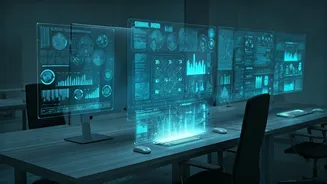Critical Thinking
Critical thinking stands as a cornerstone in the face of AI's advancements. It involves analyzing information objectively, evaluating arguments, and making
reasoned judgments. Unlike AI, which excels at pattern recognition, critical thinking allows you to assess the underlying logic and potential biases. It empowers you to go beyond the surface, identify assumptions, and formulate well-reasoned conclusions. Cultivating this skill is crucial because it helps you to evaluate information, solve problems creatively, and make informed decisions, all essential in an era of rapid technological change and complex data sets.
Creativity & Innovation
Creativity and innovation are vital skills that differentiate human capabilities from AI. While AI can generate content or solutions, the ability to conceive novel ideas, develop new approaches, and think outside the box remains uniquely human. This skill involves seeing problems from new angles, connecting seemingly unrelated concepts, and devising original solutions. Nurturing your creative abilities means embracing experimentation, exploring diverse perspectives, and constantly seeking new sources of inspiration. Creativity helps you to lead innovation and adapt to unexpected challenges in a world where change is constant.
Emotional Intelligence
Emotional intelligence, or EI, is crucial for navigating the human aspects of the workplace. EI encompasses self-awareness, self-regulation, empathy, and social skills. These abilities are essential for effective communication, building strong relationships, and leading and motivating others. While AI can analyze data and make predictions, it lacks the human capacity to understand emotions, interpret nuances, and respond appropriately to social cues. Developing your EI allows you to build stronger team dynamics, resolve conflicts effectively, and create a positive work environment, all of which are essential in settings with diverse teams and clients.
Adaptability & Flexibility
Adaptability and flexibility are critical for navigating the ever-changing work environment shaped by AI. These skills involve the ability to embrace change, learn new things, and adjust to new situations and technologies. The rapid evolution of AI means that workers need to be willing and able to acquire new skills, embrace new roles, and approach challenges with an open mind. Being adaptable includes a growth mindset, a willingness to learn from failures, and the ability to pivot as needed. In a future where job roles and industry landscapes are continually shifting, the ability to adapt ensures career longevity and ongoing relevance.
Complex Problem-Solving
Complex problem-solving involves taking on intricate and multifaceted challenges, analyzing them thoroughly, and developing effective solutions. This skill entails breaking down complex issues into manageable components, identifying underlying causes, and synthesizing information from diverse sources. AI excels at processing vast amounts of data, but it is often less effective at understanding the intricacies and contextual factors of complex problems that involve human elements or real-world constraints. Strengthening this skill includes practicing analytical thinking, developing strategic planning abilities, and enhancing your ability to make decisions under uncertainty. This skill is extremely valuable for leadership, innovation, and strategic thinking.
Data Literacy
Data literacy involves the ability to understand, interpret, and make informed decisions based on data. With the increasing prevalence of data-driven systems, it is essential to be able to access, analyze, and communicate data effectively. This includes understanding data sources, recognizing patterns, evaluating statistical claims, and translating data insights into actionable strategies. Becoming data literate empowers you to use AI tools, collaborate effectively with data scientists, and make data-driven decisions that can drive performance and innovation. In a world where data is a primary asset, these skills are essential for both technical and non-technical professionals.












